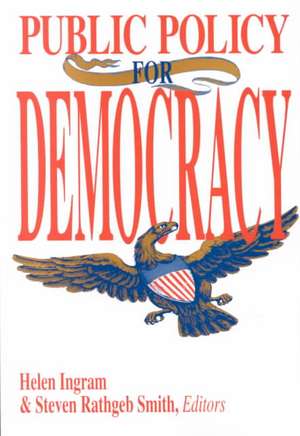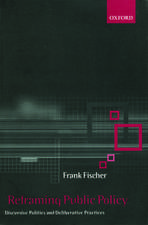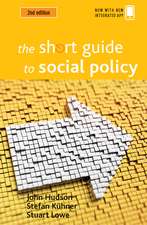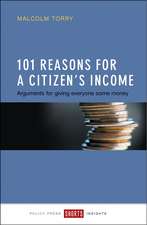Public Policy for Democracy
Editat de Helen Ingram, Steven Rathgeb Smithen Limba Engleză Paperback – noi 1993
A fundamental rethinking is under way about the roles of government, citizens, and community organizations in public policy. Can government be reconstructed to make public policies more responsive to citizens and thus more effective? This challenge is apparent in the activist policy agenda of the Clinton administration, which supports national service programs, government-voluntary collaborations, and community-based development projects.
Public Policy for Democracy is an important and timely contribution to the current discussion of how to get people more involved in their own governance. In this book, contributors urge policymakers and policy analysts to promote a more vigorous and inclusive democracy by incorporating concerns about citizenship in their craft, rather than strictly emphasizing efficiency and effectiveness.
The authors provide insight into how the social construction of politics affects the recipients of the policies and the public in general. They call attention to how policies reinforce negative stereotypes of some groups, such as welfare recipients, and often lead to political alienation and withdrawal. In addition, they discuss how polices using "clinical reason"—a term borrowed from medicine and used as a way to classify people—are increasingly applied to nonmedical situations, such as domestic violence, to restrict individual power and legitimacy. The authors argue that much needs to be done by the government itself to improve policy design and empower all citizens to participate in the democratic process. They identify concrete strategies for policymakers to enhance the role of citizens without sacrificing program effectiveness.
Public Policy for Democracy is an important and timely contribution to the current discussion of how to get people more involved in their own governance. In this book, contributors urge policymakers and policy analysts to promote a more vigorous and inclusive democracy by incorporating concerns about citizenship in their craft, rather than strictly emphasizing efficiency and effectiveness.
The authors provide insight into how the social construction of politics affects the recipients of the policies and the public in general. They call attention to how policies reinforce negative stereotypes of some groups, such as welfare recipients, and often lead to political alienation and withdrawal. In addition, they discuss how polices using "clinical reason"—a term borrowed from medicine and used as a way to classify people—are increasingly applied to nonmedical situations, such as domestic violence, to restrict individual power and legitimacy. The authors argue that much needs to be done by the government itself to improve policy design and empower all citizens to participate in the democratic process. They identify concrete strategies for policymakers to enhance the role of citizens without sacrificing program effectiveness.
Preț: 215.79 lei
Nou
Puncte Express: 324
Preț estimativ în valută:
41.29€ • 43.22$ • 34.37£
41.29€ • 43.22$ • 34.37£
Carte tipărită la comandă
Livrare economică 31 martie-14 aprilie
Preluare comenzi: 021 569.72.76
Specificații
ISBN-13: 9780815741534
ISBN-10: 0815741537
Pagini: 274
Dimensiuni: 152 x 229 x 21 mm
Greutate: 0.39 kg
Ediția:New.
Editura: Brookings Institution Press
Colecția Brookings Institution Press
ISBN-10: 0815741537
Pagini: 274
Dimensiuni: 152 x 229 x 21 mm
Greutate: 0.39 kg
Ediția:New.
Editura: Brookings Institution Press
Colecția Brookings Institution Press
Notă biografică
Edited by Helen Ingram and Steven Rathgeb Smith
Descriere
A fundamental rethinking is under way about the roles of government, citizens, and community organizations in public policy. Can government be reconstructed to make public policies more responsive to citizens and thus more effective? This challenge is apparent in the activist policy agenda of the Clinton administration, which supports national service programs, government-voluntary collaborations, and community-based development projects.
Public Policy for Democracy is an important and timely contribution to the current discussion of how to get people more involved in their own governance. In this book, contributors urge policymakers and policy analysts to promote a more vigorous and inclusive democracy by incorporating concerns about citizenship in their craft, rather than strictly emphasizing efficiency and effectiveness.
The authors provide insight into how the social construction of politics affects the recipients of the policies and the public in general. They call attention to how policies reinforce negative stereotypes of some groups, such as welfare recipients, and often lead to political alienation and withdrawal. In addition, they discuss how polices using "clinical reason"—a term borrowed from medicine and used as a way to classify people—are increasingly applied to nonmedical situations, such as domestic violence, to restrict individual power and legitimacy. The authors argue that much needs to be done by the government itself to improve policy design and empower all citizens to participate in the democratic process. They identify concrete strategies for policymakers to enhance the role of citizens without sacrificing program effectiveness.
Public Policy for Democracy is an important and timely contribution to the current discussion of how to get people more involved in their own governance. In this book, contributors urge policymakers and policy analysts to promote a more vigorous and inclusive democracy by incorporating concerns about citizenship in their craft, rather than strictly emphasizing efficiency and effectiveness.
The authors provide insight into how the social construction of politics affects the recipients of the policies and the public in general. They call attention to how policies reinforce negative stereotypes of some groups, such as welfare recipients, and often lead to political alienation and withdrawal. In addition, they discuss how polices using "clinical reason"—a term borrowed from medicine and used as a way to classify people—are increasingly applied to nonmedical situations, such as domestic violence, to restrict individual power and legitimacy. The authors argue that much needs to be done by the government itself to improve policy design and empower all citizens to participate in the democratic process. They identify concrete strategies for policymakers to enhance the role of citizens without sacrificing program effectiveness.












